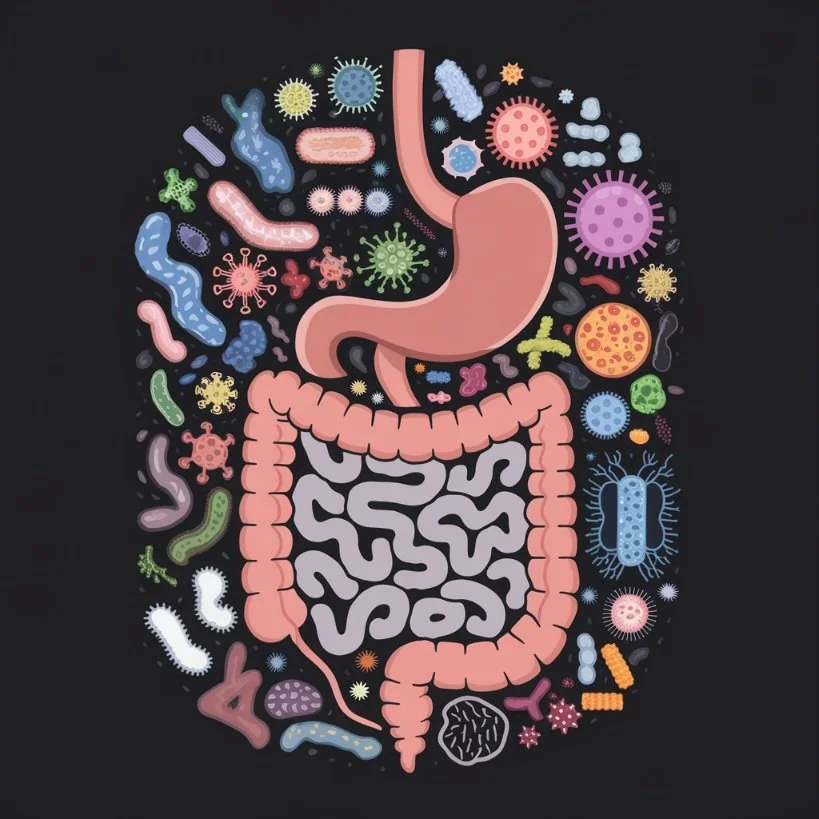Nurturing Gut Health for Total Wellness: A Comprehensive Guide
Nurturing Gut Health for Total Wellness: A Comprehensive Guide
As a Traditional Naturopath and Functional Diagnostic Nutrition® Practitioner, I am thrilled to guide you through the fascinating world of gut health—a cornerstone of our overall well-being. Did you know that the state of your gut can influence everything from your immune function and hormone balance to your mental clarity and emotional resilience? It’s true! Our gut is often called our "second brain," and for a good reason. It plays a crucial role in almost every aspect of our health.
In this comprehensive guide, we'll explore how nurturing your gut can transform your life. Whether you’re dealing with digestive discomfort, seeking better energy levels, or looking to boost your mood and immune system, focusing on gut health is a great place to start. We'll dive deep into understanding the difference between good and bad bacteria, what causes imbalances, and, most importantly, how to restore harmony in your digestive system.
Grab a cup of herbal tea, settle in, and let’s embark on this journey to nurturing your gut and achieving total wellness together!
The Difference Between Good and Bad Bacteria
Your gut is home to a vast community of microorganisms, including bacteria, viruses, fungi, and other microbes, collectively known as the gut microbiome. Among these, bacteria play a significant role in your health.
Good Bacteria: Beneficial bacteria, often referred to as probiotics, are crucial for maintaining gut health. They aid in digestion, produce essential vitamins (like vitamin K and certain B vitamins), support the immune system, and protect the gut lining from harmful invaders. Common beneficial strains include Lactobacillus and Bifidobacterium, which are found in fermented foods such as yogurt, kefir, sauerkraut, and kimchi, as well as in high-quality probiotic supplements.
Bad Bacteria: On the flip side, harmful bacteria can cause a range of issues when they grow out of balance. These pathogens can produce toxins, trigger inflammation, and damage the gut lining, leading to conditions like leaky gut syndrome. Some common harmful bacteria include specific strains of Escherichia coli (E. coli), Clostridium difficile (C. diff), and Salmonella.
What Causes an Imbalance of Bad Bacteria?
An imbalance in your gut microbiome, known as dysbiosis, can be triggered by various factors. Here are some common causes:
1. Poor Diet: Diets high in refined sugars, processed foods, and unhealthy fats can feed harmful bacteria and yeast, leading to an overgrowth. For instance, studies have shown that a diet rich in sugar and fat can alter the composition of gut bacteria, promoting the growth of harmful species like Firmicutes while decreasing beneficial Bacteroidetes.
2. Antibiotic Overuse: While antibiotics are sometimes necessary, they can disrupt the gut microbiome by killing off both good and bad bacteria. This leaves room for opportunistic pathogens to take over. Research has shown that even short courses of antibiotics can significantly reduce microbial diversity in the gut, with effects that may last for months or even years.
3. Chronic Stress: Stress has a profound impact on the gut. It can alter gut motility, increase gut permeability (leading to leaky gut), and change the composition of the gut microbiota. Chronic stress has been linked to a decrease in beneficial bacteria like Lactobacillus and an increase in harmful bacteria.
4. Lack of Sleep: Poor sleep disrupts the natural circadian rhythms that govern your gut. Studies have shown that irregular sleep patterns can lead to an imbalance in the gut microbiome, potentially contributing to metabolic disorders like obesity and diabetes.
5. Environmental Toxins: Exposure to environmental toxins, such as pesticides, heavy metals, and chemicals found in food and water, can negatively impact gut health. These toxins can disrupt the microbial balance, damage the gut lining, and trigger systemic inflammation.
Fun Fact
Did you know that the human gut microbiome is so unique that it's often referred to as your "second fingerprint"? No two people have the exact same composition of gut bacteria, even identical twins! This microbial "fingerprint" plays a crucial role in your digestion, immune system, and even mood, highlighting just how personalized our internal ecosystems truly are.
How to Improve Good Bacteria
Restoring a healthy balance of good bacteria in your gut requires a multifaceted approach. Here’s how you can nurture your gut microbiome:
1. Adopt a Whole Food, Plant-Based Diet: A diet rich in diverse, fiber-packed plants is one of the best ways to support a healthy gut. Fiber acts as a prebiotic, feeding the good bacteria in your gut. Foods like leafy greens, fruits, vegetables, legumes, and whole grains are excellent sources. A study published in the journal Nutrients found that a diet high in plant-based foods increases microbial diversity and promotes the growth of beneficial bacteria.
2. Incorporate Fermented Foods: Fermented foods are naturally rich in probiotics, which can help replenish and diversify your gut bacteria. Sauerkraut, kimchi, kefir, kombucha, and miso are great choices. Research has shown that regular consumption of fermented foods can increase the abundance of beneficial bacteria like Lactobacillus and Bifidobacterium.
3. Limit Processed Foods and Sugar: Processed foods and sugars promote the growth of harmful bacteria and yeast, which can lead to dysbiosis. By reducing these foods in your diet, you can help prevent the overgrowth of bad bacteria. A study in the British Journal of Nutrition found that diets high in refined carbohydrates and sugars are linked to increased gut inflammation and reduced microbial diversity.
4. Take a High-Quality Probiotic Supplement: Not all probiotics are created equal. Look for a supplement with multiple strains, including Lactobacillus and Bifidobacterium, and ensure it comes from a reputable source. Probiotic supplements can help restore balance, especially after a course of antibiotics or during periods of high stress.
5. Use Herbs and Spices: Certain herbs and spices have antimicrobial properties that can help keep harmful bacteria in check while supporting overall gut health. Garlic, ginger, turmeric, and oregano are particularly effective. For example, turmeric has been shown to enhance the growth of beneficial bacteria while inhibiting the growth of pathogens.
6. Stay Hydrated: Water is essential for maintaining the mucosal lining of the intestines, which acts as a barrier against harmful bacteria. Proper hydration also supports digestion and helps prevent constipation, which can contribute to dysbiosis .
The Role of Gut Health in Hormone Balance, Disease Prevention, and Emotional Well-being
Your gut is often referred to as your “second brain” because of its profound connection to other systems in the body, including the endocrine (hormonal) and nervous systems. Here’s how gut health influences various aspects of your health:
1. Hormone Balance: Your gut bacteria play a role in the production and regulation of hormones. For example, certain gut bacteria help metabolize and regulate estrogen levels. Dysbiosis can lead to hormonal imbalances, contributing to conditions like PMS, PCOS, and even infertility.
2. Disease Prevention: A healthy gut helps protect against chronic diseases, including autoimmune conditions, obesity, diabetes, and cardiovascular disease. The gut barrier prevents toxins and pathogens from entering the bloodstream and triggering inflammation, which is a root cause of many chronic diseases.
3. Emotional and Mental Well-being: The gut-brain axis is a bidirectional communication network between the gut and the brain. An imbalance in gut bacteria can influence mood, stress levels, and mental health conditions like anxiety and depression. Studies have shown that probiotics can help alleviate symptoms of depression and anxiety by modulating the gut microbiome.
How a Healthy Gut Enhances Quality of Life
When your gut is healthy, every part of your life improves. You’ll experience better digestion, enhanced nutrient absorption, more energy, clearer skin, and improved mental clarity. A balanced gut microbiome also supports a strong immune system, helping you fend off infections and recover more quickly from illness. Simply put, a healthy gut is foundational to feeling your best every day.
Functional Labs to Get to the Root Cause
Understanding your unique gut health requires more than just guessing—it requires data. Functional labs can provide insights into your gut microbiome and identify underlying issues. Here are some key tests:
1. Comprehensive Stool Analysis: This test evaluates your gut bacteria, including the balance of good and bad strains, the presence of parasites, yeast overgrowth, and digestive function markers like pancreatic elastase.
2. Organic Acids Test (OAT): This urine test detects metabolic byproducts that can indicate bacterial or fungal overgrowth, nutrient deficiencies, and oxidative stress in the body.
3. Food Sensitivity Testing: Identifying foods that trigger an immune response can help reduce inflammation and support gut healing.
4. Mucosal Barrier Assessment: Also known as an intestinal permeability test, this test measures the ability of your gut lining to function as a barrier, which is crucial for preventing toxins from entering the bloodstream.
A Comprehensive Gut Health Protocol
Step 1: Labs
Start with a comprehensive stool analysis, OAT, food sensitivity, and mucosal barrier assessment to identify imbalances and underlying issues.
Step 2: Supplements and Nutrients
- Probiotics: Choose a multi-strain probiotic from a reputable brand.
- L-Glutamine: Supports gut lining repair.
- Digestive Enzymes: Aid in breaking down food and improving nutrient absorption.
- Omega-3 Fatty Acids: Reduce inflammation and support gut health.
- Herbs: Consider supplements like turmeric, garlic, and ginger to support microbial balance.
Where to buy:
International code KXCTGG
Step 3: Diet
Follow a whole food, plant-based diet rich in fiber, fermented foods, and anti-inflammatory herbs and spices. Limit processed foods, sugars, and alcohol.
Step 4: Rest and Stress Reduction
Prioritize sleep and stress management techniques such as mindfulness, meditation, or stretching to support your gut-brain axis.
Step 5: Positive Attitude and Mindfulness
Cultivate a positive mindset and practice mindfulness to further support your gut health. The gut-brain connection means that your mental state can directly impact your gut microbiome. Regular mindfulness practices, such as meditation, deep breathing exercises, or spending time in nature, can help reduce stress and promote a balanced gut.
How to Implement This Protocol
1. Start with Testing: Schedule functional lab tests to get a clear picture of your gut health. This will help tailor your protocol to your specific needs.
2. Incorporate Supplements: Based on your lab results and personal health needs, introduce the recommended supplements to support gut healing and microbial balance.
3. Revamp Your Diet: Transition to a whole food, plant-based diet. Start by gradually replacing processed foods with nutrient-dense options like vegetables, fruits, legumes, nuts, seeds, and whole grains. Incorporate fermented foods daily to naturally boost your probiotic intake.
4. Focus on Lifestyle: Make sleep a priority by establishing a regular sleep schedule and creating a relaxing bedtime routine. Incorporate stress-reducing activities into your daily routine, such as stretching, meditation, or even a simple daily walk.
5. Practice Mindfulness: Set aside time each day for mindfulness practices that resonate with you. This could be as simple as mindful eating, where you focus on enjoying each bite of your food, or practicing gratitude before bed.
Call to Action
Your journey to optimal health begins in the gut. By taking these steps to balance your gut microbiome, you’re not just improving your digestion—you’re enhancing your overall quality of life. I encourage you to start with functional lab testing to uncover the root causes of any imbalances and to work with a knowledgeable practitioner who can guide you through this personalized journey.
If you’re ready to take charge of your health and transform your well-being from the inside out, I invite you to schedule a Complementary Discovery Call. Together, we’ll create a customized gut health plan tailored to your unique needs, with functional lab testing, incorporating professional-grade supplements, targeted nutrition, and lifestyle strategies to help you achieve vibrant health. Let’s embark on this journey towards a healthier, happier you!
Remember, a healthy gut is the foundation of a healthy life—take the first step today!
References:
1. Gut Microbiome and Diet:
- Wu, G. D., et al. (2011). "Linking long-term dietary patterns with gut microbial enterotypes." Science, 334(6052), 105-108. Retrieved from [Science Magazine]
- De Filippis, F., et al. (2016). "High-level adherence to a Mediterranean diet beneficially impacts the gut microbiota and associated metabolome." Gut, 65(11), 1812-1821. Retrieved from [Gut Journal]
2. Effects of Antibiotics on Gut Microbiome:
- Dethlefsen, L., et al. (2008). "The pervasive effects of an antibiotic on the human gut microbiota, as revealed by deep 16S rRNA sequencing." PLoS Biology, 6(11), e280. Retrieved from [PLoS Biology]
3. Impact of Stress on Gut Health:
- Moloney, R. D., et al. (2014). "The microbiome: stress, health and disease." Molecular Neurobiology, 49(3), 736-756. Retrieved from [Springer]
4. Effect of Sleep on Gut Microbiome:
- Benedict, C., Vogel, H., Jonas, W., et al. (2016). "Gut microbiota and glucometabolic alterations in response to sleep loss in healthy individuals." Molecular Metabolism, 5(12), 1175-1186. Retrieved from [Molecular Metabolism]
5. Environmental Toxins and Gut Health:
- Järup, L. (2003). "Hazards of heavy metal contamination." British Medical Bulletin, 68(1), 167-182. Retrieved from [Oxford Academic]
6. Herbs and Gut Health:
- Scully, C., & Ettlin, D. A. (2017). "Herbs and Spices: Their Health Benefits and Risks." Journal of Clinical & Translational Endocrinology, 6, 74-82. Retrieved from [ScienceDirect]
7. Gut-Brain Axis and Emotional Well-being:
- Foster, J. A., & Neufeld, K. M. (2013). "Gut–brain axis: How the microbiome influences anxiety and depression." Trends in Neurosciences, 36(5), 305-312. Retrieved from [Trends in Neurosciences]
These references provide the scientific backing for the information discussed in the blog article, and you can visit these websites to explore the studies in detail.
Citations on related to gut bacteria:
1. Lactobacillus and Bifidobacterium:
- Klaenhammer, T. R., Altermann, E., Arigoni, F., et al. (2002). "Discovering lactic acid bacteria by genomics and proteomics: The Lactobacillus acidophilus group." Journal of Nutrition, 132(12), 2528-2530. [Oxford Academic]
2. Escherichia coli (E. coli), Clostridium difficile (C. diff), and Salmonella:
- "E. coli and Clostridium difficile in Gut Health." (2015). Centers for Disease Control and Prevention (CDC).[CDC] and [CDC]
3. Firmicutes and Bacteroidetes Ratio:
- Ley, R. E., Turnbaugh, P. J., Klein, S., & Gordon, J. I. (2006). "Microbial ecology: Human gut microbes associated with obesity." Nature, 444(7122), 1022-1023.[Nature]
4. Study Published in the Journal Nutrients:
- Makki, K., Deehan, E. C., Walter, J., & Bäckhed, F. (2018). "The Impact of Dietary Fiber on Gut Microbiota in Host Health and Disease." Nutrients, 10(10), 1205. [MDPI Nutrients]
Each of these sources provides detailed information about specific bacteria, their roles, and impacts on human gut health, as well as broader insights into the gut microbiome's influence on health and disease.
DISCLAIMER: The health information in this blog are for general education and is not intended to substitute for any medical advice. No medical cure, diagnosis, or treatment is provided.
This website contains affiliate links, which means LTL may receive a percentage of any product or service you purchase using the links in the items descriptions, articles or advertisements. You will pay the same price for all products and services, and your purchase helps support our ongoing effort in assisting you. Thanks for your support!
✨ Unlock expert wellness insights! 🌿 Subscribe now for exclusive health tips & natural living secrets! 🌱💪🏾



